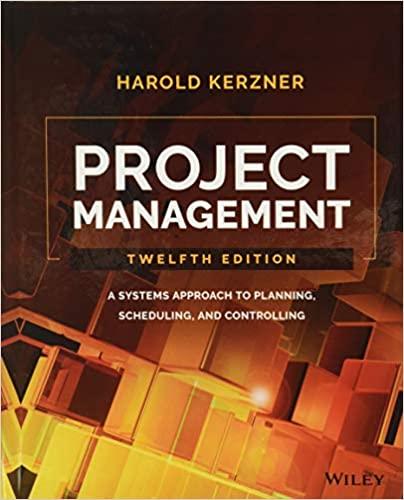A project sponsor forces the project management to include a management reserve in the cost of a
Question:
A project sponsor forces the project management to include a management reserve in the cost of a project. However, the project sponsor intends to use the management reserve for his own “pet” project and this creates problems for the project manager.
Sole-Source Contract
The Structural Engineering Department at Avcon, Inc. made a breakthrough in the development of a high-quality, low-weight composite material. Avcon believed that the new material could be manufactured inexpensively and Avcon’s clients would benefit by lowering their manufacturing and shipping costs. News of the breakthrough spread through the industry. Avcon was asked by one of its most important clients to submit an unsolicited proposal for design, development, and testing of products for the client using the new material. Jane would be the project manager. She had worked with the client previously as the project manager on several other projects that were considered successes.
Meeting with Tim
Because of the relative newness of the technology, both Avcon and the client understood that this could not be a firm-fixed-price contract. They ultimately agreed to a cost-plus-incentive-fee contract type. However, the target costs still had to be determined. Jane worked with all of the functional managers to determine what their efforts would be on this contract. The only unknown was the time and cost needed for structural testing. Structural testing would be done by the Structural Engineering Department, which was responsible for making the technical breakthrough. Tim was head of the Structural Engineering Department. Jane set up a meeting to discuss the cost of testing on this project. During the meeting, Tim replied:
A full test matrix will cost about $100,000. I believe that we should price out the full test matrix and also include a management reserve of at least $100,000 should anything go wrong.
Jane was a little perplexed about adding in a management reserve. Tim was usually right on the money on his estimates and Jane knew from previous experience that a full test matrix might not be needed. But Tim was the subject matter expert and Jane reluctantly agreed to include in the contract a management reserve of $100,000. As Jane was about to exit Tim’s office, Tim remarked:
Jane, I had requested to be your project sponsor on this effort and management has given me the okay. You and I will be working together on this effort. As such, I would like to see all of the cost figures before submitting the final bid to the client.
Reviewing Cost Figures
Jane had worked with Tim before but not in a situation where Tim would be the project sponsor. However, it was common on some contracts that lower and middle levels of management would assume the sponsorship role rather than having all sponsorship at the top of the organization. Jane met with Tim and showed him the following information, which would appear in the proposal:
● Sharing ratio: 90–10%
● Contract cost target: $800,000
● Contract profit target: $50,000
● Management reserve: $100,000
● Profit ceiling: $70,000
● Profit floor: $35,000
Tim looked at the numbers and Jane could see that he was somewhat unhappy. Tim then stated:
Jane, I do not want to identify to the client that we have a management reserve. Let’s place the management reserve in with the $800,000 and change the target cost to $900,000. I know that the cost baseline should not include the management reserve, but in this case I believe it is necessary to do so. Jane knew that the cost baseline of a project does not include the management reserve, but there was nothing she could do; Tim was the sponsor and had the final say. Jane simply could not understand why Tim was trying to hide the management reserve.
Execution Begins
Tim instructed Jane to include in the structural test matrix work package the entire management reserve of $100,000. Jane knew from previous experience that a full test matrix was not required and that the typical cost of this work package should be between $75,000 and $90,000. Establishing a work package of $200,000 meant that Tim had complete control over the management reserve and how it would be used. Jane was now convinced that Tim had a hidden agenda. Unsure what to do next, Jane contacted a colleague in the Project Management Office. The colleague informed Jane that Tim had tried unsuccessfully to get some of his pet projects included in the portfolio of projects, but management refused to include any of Tim’s projects in the budget for the portfolio. It was now clear what Tim was asking Jane to be part of and why Tim had requested to be the project sponsor. Tim was forcing Jane to violate PMI’s Code of Ethics and Professional Conduct.
QUESTIONS
1. Why did Tim want to add in a management reserve?
2. Why did Tim want to become the project sponsor?
3. Are Tim’s actions a violation of the Code of Ethics and Professional Conduct?
4. If Jane follows Tim instructions, is Jane also in violation of the Code of Ethics and Professional Conduct?
5. What are Jane’s options if she decides not to follow Tim’s instructions?
Step by Step Answer:

Project Management A Systems Approach To Planning Scheduling And Controlling
ISBN: 9781119165354
12th Edition
Authors: Harold Kerzner





